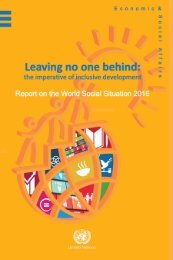Migrant Smuggling Data and Research
zgw9fv2
zgw9fv2
Create successful ePaper yourself
Turn your PDF publications into a flip-book with our unique Google optimized e-Paper software.
Regarding mixed survey methods using quantitative <strong>and</strong> qualitative data<br />
on migrant exploitation, abuse <strong>and</strong>/or deaths, survey or other data on migrants’<br />
views on smuggling, there are reports released by certain NGOs <strong>and</strong> international<br />
NGOs: Amnesty International (2015), Human Rights Watch (2008), Helsinki<br />
Citizens’ Assembly (2007), GLOBAL: Policy <strong>and</strong> Strategy think-tank (2015), <strong>and</strong> the<br />
Association for Solidarity with Refugees (Mülteci-Der) (2007). As far as the policy<br />
utility of the research on irregular migrant <strong>and</strong> smuggling, it can be concluded<br />
that although those conducted for international organizations <strong>and</strong> compiled by<br />
NGOs <strong>and</strong> international NGOs include some policy recommendations, related<br />
academic research has almost never been policy-oriented.<br />
CASE STUDY: <strong>Smuggling</strong> Syrians from Turkey to Greece<br />
The massive exodus of Syrian refugees creates a grave migrant smuggling problem spanning<br />
from the Middle East <strong>and</strong> Turkey to Europe <strong>and</strong> even further. The Syrian civil war is,<br />
unfortunately, in its fifth year <strong>and</strong> does not look to end anytime soon. Even as this chapter on<br />
Turkey is being written, more than 100,000 Syrians from Aleppo are at the doors of Turkey. It is<br />
expected that this would create a significant spillover effect on Europe <strong>and</strong> other destination<br />
countries as well. Here is one case of a Syrian family who was smuggled from Turkey to a Greek<br />
isl<strong>and</strong>:<br />
Aziz <strong>and</strong> his family are from Homs, Syrian Arab Republic. Due to the civil war <strong>and</strong> escalating<br />
violence, they left their country in 2013 <strong>and</strong> came to Turkey. They belong to the majority of<br />
Syrians who were not settled in refugee camps. They got temporary refugee status in Turkey.<br />
After staying a short while with friends in Gaziantep not far from the Syrian border, they found<br />
accommodation near Aksaray, Istanbul. Soon enough, they realized they were going to stay<br />
in Turkey much longer than they expected. However, when their savings ran out, as Istanbul<br />
is very expensive, Aziz found a job in the informal economy with the help of another Syrian<br />
refugee. By the end of 2014, he made up his mind to go to Greece with human smugglers<br />
<strong>and</strong> then to Germany to start a new life. He heard many stories from his friends who took the<br />
l<strong>and</strong> route to Greece <strong>and</strong> Bulgaria <strong>and</strong> knew it was a difficult journey to cross the Evros River<br />
that involves lots of walking at night <strong>and</strong> hiding during the day. With two small children, he<br />
decided to take the shorter <strong>and</strong> cheaper sea route instead, despite the perils involved. The<br />
first smuggler ran off with the money. So, the second time, they wanted to find a “trusted”<br />
smuggler <strong>and</strong> contacted one Syrian national with good reputation in social media. The use of<br />
social media – such as Facebook, WhatsApp <strong>and</strong> Viber – is quite common among the migrants<br />
in Turkey who would like to use the service provided by human smugglers. In the spring of<br />
2015, the smuggler took him <strong>and</strong> his family to Izmir by bus. There were many others with<br />
them in the bus, including a Bangladeshi refugee (possibly a Rohingya), two Iraqis, some other<br />
Syrians, <strong>and</strong> an Afghan family. The Afghans tried to cross the Aegean twice on their own with<br />
no success. First, their boat was caught by the Turkish Coast Guard <strong>and</strong> confiscated. Then,<br />
the second time, they could not inflate the boat they purchased from the local market. They<br />
changed places regularly <strong>and</strong> were told to be ready to leave anytime. Since it is not the high<br />
season, they were asked to pay USD 1,400 for the two of them. The children would travel free.<br />
During the summer months when the sea is calmer, the prices soar greatly <strong>and</strong> go up as high as<br />
USD 1,500 per person. Refugees <strong>and</strong> asylum seekers from the Syrian Arab Republic spend large<br />
sums of money <strong>and</strong> are desperate to take the risks to reach Europe. He understood that this<br />
Syrian smuggler – a refugee himself with good comm<strong>and</strong> of Turkish as far as he could tell – was<br />
only an intermediary <strong>and</strong> in communication with others involved in the smuggling business.<br />
Aziz gave half of this money in Istanbul to the Syrian intermediary, <strong>and</strong> the rest was deposited<br />
to an office called Secure Your Money along with a password. They were then transferred<br />
150<br />
6. Turkey
















